De Franse schrijver André Gide werd geboren op 22 november 1869 in Parijs. Zie ook alle tags voor André Gide op dit blog.
Uit: Si le grain ne meur
« Je naquis le 22 novembre 1869. Mes parents occupaient alors, rue de Médicis, un appartement au quatrième ou cinquième étage, qu’ils quittèrent quelques années plus tard, et dont je n’ai pas gardé souvenir. Je revois pourtant le balcon ; ou plutôt ce qu’on voyait du balcon : la place à vol d’oiseau et le jet d’eau de son bassin — ou, plus précisément encore, je revois les dragons de papier, découpés par mon père, que nous lancions du haut de ce balcon, et qu’emportait le vent, par-dessus le bassin de la place, jusqu’au jardin du Luxembourg où les hautes branches des marronniers les accrochaient. Je revois aussi une assez grande table, celle de la salle à manger sans doute, recouverte d’un tapis bas tombant ; au-dessous de quoi je me glissais avec le fils de la concierge, un bambin de mon âge qui venait parfois me retrouver. — Qu’est-ce que vous fabriquez là-dessous ? criait ma bonne. — Rien. Nous jouons. Et l’on agitait bruyamment quelques jouets qu’on avait emportés pour la frime. En vérité nous nous amusions autrement : l’un près de l’autre, mais non l’un avec l’autre pourtant, nous avions ce que j’ai su plus tard qu’on appelait « de mauvaises habitudes ». Qui de nous deux en avait instruit l’autre ? et de qui le premier les tenait-il ? Je ne sais. Il faut bien admettre qu’un enfant parfois à nouveau les invente. Pour moi je ne puis dire si quelqu’un m’enseigna ou comment je découvris le plaisir ; mais, aussi loin que ma mémoire remonte en arrière, il est là. Je sais de reste le tort que je me fais en racontant ceci et ce qui va suivre ; je pressens le parti qu’on en pourra tirer contre moi. Mais mon récit n’a raison d’être que véridique. Mettons que c’est par pénitence que je l’écris. A cet âge innocent où l’on voudrait que toute l’âme ne soit que transparence, tendresse et pureté, je ne revois en moi qu’ombre, laideur, sournoiserie. On m’emmenait au Luxembourg ; mais je me refusais à jouer avec les autres enfants ; je restais à l’écart, maussadement, près de ma bonne ; je considérais les jeux des autres enfants. Ils faisaient, à l’aide de seaux, des rangées de jolis pâtés de sable… Soudain, à un moment que ma bonne tournait la tête, je m’élançais et piétinais tous les pâtés. »
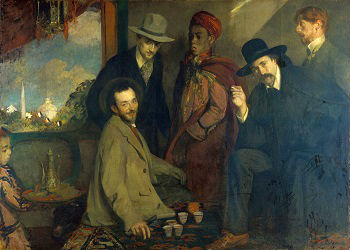
André Gide (22 november 1869 – 19 februari 1951)
André Gide et ses amis au Café maure de l’exposition universelle de 1900 door Jacques-Émile Blanche. Gide rechts, met hoed.
De Engelse dichteres en schrijfster George Eliot werd geboren op 22 november 1819 in Nuneaton in Warwickshire. Zie ook alle tags voor George Eliot op dit blog.
Uit: Romola
“More than three centuries and a half ago, in the mid spring-time of 1492, we are sure that the angel of the dawn, as he travelled with broad slow wing from the Levant to the Pillars of Hercules, and from the summits of the Caucasus across all the snowy Alpine ridges to the dark nakedness of the Western isles, saw nearly the same outline of firm land and unstable sea–saw the same great mountain shadows on the same valleys as he has seen to-day–saw olive mounts, and pine forests, and the broad plains green with young corn or rain-freshened grass–saw the domes and spires of cities rising by the river-sides or mingled with the sedge-like masts on the many-curved sea-coast, in the same spots where they rise to-day. And as the faint light of his course pierced into the dwellings of men, it fell, as now, on the rosy warmth of nestling children; on the haggard waking of sorrow and sickness; on the hasty uprising of the hard-handed labourer; and on the late sleep of the night-student, who had been questioning the stars or the sages, or his own soul, for that hidden knowledge which would break through the barrier of man’s brief life, and show its dark path, that seemed to bend no whither, to be an arc in an immeasurable circle of light and glory.
The great river-courses which have shaped the lives of men have hardly changed; and those other streams, the life-currents that ebb and flow in human hearts, pulsate to the same great needs, the same great loves and terrors. As our thought follows close in the slow wake of the dawn, we are impressed with the broad sameness of the human lot, which never alters in the main headings of its history–hunger and labour, seed-time and harvest, love and death.”
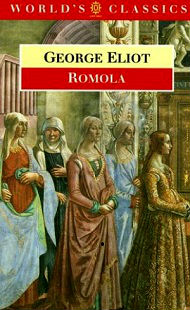
George Eliot (22 november 1819 – 22 december 1880)
Cover
De Nederlandse schrijver Dirk van Weelden werd geboren in Zeist op 22 november 1957. Zie ook alle tags voor Dirk van Weelden op dit blog.
Uit:Suburbane horror
“Er is een zwart-witfoto waarop mijn broer en ik, kleuters in identieke winterjassen, op een besneeuwde en bevroren zandvlakte staan. Samen met mijn moeder kijken we in een grote langwerpige kuil van anderhalve meter diep. Op de bodem daarvan steken paaltjes omhoog waarlangs bleke latten zijn getimmerd. In die kuil, zo vertelde mijn vader, die ons verzocht in de kuil te wijzen – wat we zo te zien lichtelijk verbaasd deden terwijl hij afdrukte -, zou het nieuwe huis komen.
Een jaar later trokken we in het huis in de buitenwijk van een middelgrote provinciestad. Alles was nieuw. Toen bij ons binnen het linoleum gelegd was, de meubels hun plaats hadden gevonden en de futuristische kolenhaard met de indrukwekkende naam Bronco Pascha loeide, reed er een bulldozer door de blubber die onze achtertuin zou worden. Het winkelcentrum was nog in aanbouw. Noodwinkels bereikten we over plankieren die wiebelden op de modder. In zijstraten werd nog volop gebouwd, aan nog meer huizen en lage flats. De boompjes waren schriel, de struiken onooglijk, maar aan alles was gedacht. Je kon goed merken dat we woonden in de degelijke uitvoering van een tot in de puntjes uitgestippeld en doorgerekend bouwplan. Ik zou er blijven wonen, naar school gaan en zien hoe de plantsoenen weelderiger en de bomen iets dikker werden totdat ik ging studeren.
Ik wil maar zeggen: aan het woord is geen stadsrat en al evenmin een dorpeling. Zoals de meerderheid van de naoorlogse bevolking in dit land ben ik opgegroeid in wat een buitenwijk heette, de Nederlandse variant van suburbia. En al de vriendjes die ik had woonden in zulke buurten. Geplande nieuwe woonomgevingen voor modale huizenbezitters in tijden van groeiende welvaart.
Uit eigen ervaring kan ik vaststellen dat het mogelijk is in zo’n omgeving prettig te wonen en zorgeloos op te groeien. Daarover gaat het hier niet. Hier gaat het om de verschrikkingen. Alle woonomgevingen kennen hun verschrikkingen. De paleizen en landhuizen van de rijken bieden naast ruimte, luxe en verfijning de beruchte kilte en eenzaamheid. Traditionele volksbuurten in grote steden gelden als warm en levendig op het verstikkende af, maar zijn overbevolkt, oncomfortabel en vaak ronduit deprimerend. In dorpen en op het platteland woont men in ruimte en rust, maar in betrekkelijke afzondering van de wereld en in een al te nauw contact met traditionele zeden en gewoontes, en onvermurwbare sociale verbanden, die een stille wreedheid aan den dag kunnen leggen.”
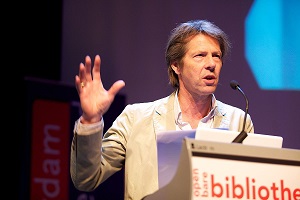
Dirk van Weelden (Zeist, 22 november 1957)
De Duitse dichter, schrijver, acteur en regisseur Christian Filips werd geboren op 22 november 1981 in Osthofen. Zie ook alle tags voor Christian Filips op dit blog.
ein weißer Schnürsenkel-
Blitz jetzt. Das ist
Mamas Hand, wie sie knotet! –
Verknoten beibringt mir
ihm beibringen will: sie
sitzt ihrem Sohn gegenüber
bindet die Senkel,
so, beide Hände
Hände beide linksrum in der Schlaufe
weiß sie
– wierum? sorum? Löffelstil
gleich selber, nein hierum!
nicht mehr –
ach spiegelverkehrt,
Mutter Gottes!
Bald schnüren wir ihn
Bald er uns
… Schlaf
ein Gletscher, jahrtausendealt
meine Hand.
Und in ihr ein Ziehn … wohin?
Halt! Da-Greift etwas
das
fühlt sich an
wie jeder
wie peitschendes
Leder wie Schnee
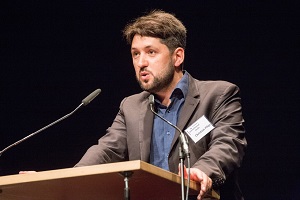
Christian Filips (Osthofen, 22 november 1981)
De Brits-Indische schrijverstweeling Suresh en Jyoti Guptara werd geboren op 22 november 1988 in Frimley, Hants in het zuidoosten van Engeland. Zie ook alle tags voor Suresh en Jyoti Guptara op dit blog.
Uit: Calaspia, Das Erbe der Apheristen (Vertaald door Frank Böhmert)
„Der mächtigste Mann Calaspias, der Imperator der Nu-mcnii, war nur ein Mensch und daher den Mächten, die sich seiner bedienten, hoffnungslos unterlegen. Er wusste nicht einmal von der längst verlorenen Schlacht. Ihn hielten persönliche Probleme im Griff. Seit geraumer Zeit hatte er sich mir Mitteln getröstet, die seinem Geisteszustand mehr schadeten als seiner Scharzkammer. Und nun, da sich die Nationen seines vermeindichen Hoheitsbereichs auf den Krieg vorbereiteten, ging der Imperator im Thronsaal in die Knie. «Seid gegrüßt, allmächtiger Herrscher!», stammelte er dem eigenen Thron entgegen. Dort saß kein Herrscher, dort lagen nur der prachtvolle Umhang. das Zepter und die Krone Ca-laspias. «Was darf ich für meinen Lehnsherrn tun?» Aurgelmir verneigte sich schwerfällig und verschüttete da-bei etwas von seinem Getränk. Seine Kleider sahen aus, als ob er blutete. «Euer Wunsch ist mir Befehl, Herr.» Er verharrte einen Moment in der Verbeugung, dann stand er auf und schüttelte sich, als ob er eben erst erwacht wäre. Er schaute sich um und stellte fest, dass er allein war. Er schien vergessen zu haben, womit er sich gerade beschäftigt hatte —und warum. Ziellos trottete cr durch den Saal, beugte sich über einen goldenen Schmuckgegenstand, um ihn zu inspizieren, und stieß mit der Nase daran. Er zuckte zurück und trottete wei-ter. Als Nächstes versuchte er, an einem Wandteppich hoch-zuklettern wie an einem Baum. Wenige Zentimeter über dem Marmorboden heulte er wie eine Urwaldbestie, dann fiel der Wandteppich herunter und beendete das Spektakel mit einem lauten Rums. Aurgelmir hatte einige Mühe, sich wieder aus dem Teppich zu befreien. Keuchend stand er auf und schnupperte.”
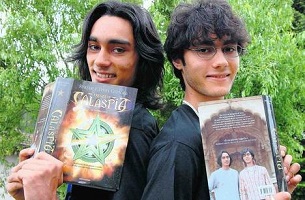
Suresh en Jyoti Guptara (Frimley, 22 november 1988)
De Russische schrijver Viktor Pelevin werd geboren op 22 november 1962 in Moskou. Zie ook alle tags voor Viktor Pelevin op dit blog.
Uit:The Sacred Book of the Werewolf (Vertaald door Andrew Bromfield)
““But the most terrible thing was that the shame didn’t simply sear my heart, it also mingled into a single whole with the pleasure I was getting from what was going on.
It was something quite unimaginable – truly beyond good and evil. It was then that I finally understood the fatal abysses trodden by De Sade and Sacher-Masoch, who I had always thought absurdly pompous. No, they weren’t absurd at all – they simply hadn’t been able to find the right words to convey the true nature of their nightmares. And I knew why – there were no such words in any human language.
‘Stop,’ I whispered through my tears.
But in heart I didn’t know what I wanted – for him to stop or to carry on.
I couldn’t hold back any longer and I started crying. But they were tears of pleasure, a monstrous, shameful pleasure that was too enthralling to be abandoned voluntarily.”
(…)
“Democracy, liberalism–those are just words on a signpost, she was right about that. But the reality is more like the microflora in your guts. In the West, all your microbes balance each other out, it’s taken centuries for you to reach that stage. They all quietly get on with generating hydrogen sulphide and keep their mouths shut. Everything’s fine-tuned, like a watch, the total balance and self-regulation of the digestive system, and above it–the corporate media, moistening it all with fresh saliva every day. That kind of organism is called the open society–why the hell should it close down, it can close down anyone else it wants with a couple of air strikes. The question is, how do you arrive at this condition? What they taught us to do was to swallow salmonella with no antibodies to fight it, or other microbes to keep it in check at all. Not surprisingly we developed such a bad case of diarrhea that three hundred billion bucks had drained out before we even began to understand what was going on.”
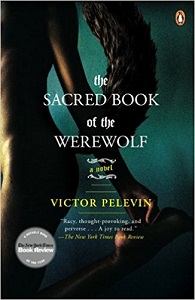
Viktor Pelevin (Moskou, 22 november 1962)
Cover
De Hongaarse dichter Endre Ady werd geboren op 22 november 1877 in het huidige Adyfalva. Zie ook alle tags voor Endre Ady op dit blog.
Memory Of A Summer Night
An angry angel hurled from the heavenly height
Drumroll alarms onto the sombre earth,
Hundreds of stars burnt out their light,
Hundreds of young brains were overturned,
Hundreds of veils were torn, defiled:
It was a curious,
Curious summer night.
Our old beehives burst into flame,
Our loveliest filly broke her leg,
I dreamt that the dead came back to light.
Our faithful dog, Burkus, disappeared,
Our good servant Meg, mute all these years,
Shrilled sudden chants of a savage rite:
It was a curious,
Curious summer night.
The worthless were swaggering bravely,
Fancy robbers went out to rob,
And true-hearted men had to hide:
It was a curious,
Curious summer night.
We gathered that man was imperfect,
Tight-fisted when sharing his love,
But still, it just couldn’t be right,
The live and the dead on the turning wheel:
Has man ever been a punier mite,
And the Moon in a more mocking mood
Than on that terrible night?
It was a curious,
Curious summer night.
And horror leaned over the spirits
with malevolent, gloating delight:
The secrets of every forefather
Dwelt deep in the souls of the sons.
And Thought, the proud servant of Man,
Inebriated, went out to lead
His blood-shedding, dreadful Wedding Feast.
That lad was lowly, lame, contrite:
It was a curious,
Curious summer night.
I know I believed that on that night
Some neglected God would soon alight
To take me and deliver me to death,
But I am still alive, though different,
Transfigured by that shattering event,
And as I am waiting for a God,
I remember that terror-haunted,
Devastating, world-burying night:
It was a curious,
Curious summer night.
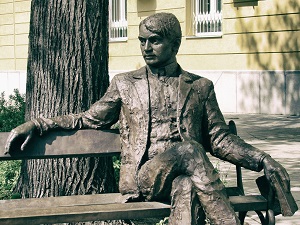
Endre Ady (22 november 1877 – 27 januari 1919)
Standbeeld in Debrecen
De Amerikaanse schrijver William Kotzwinkle werd geboren op 22 november 1943 in Scranton, Pennsylvania. Zie ook alle tags voor William Kotzwinkle op dit blog.
Uit: E.T. The Extra-Terrestrial
“The spaceship floated gently, anchored by a beam of lavender light to the earth below. Were someone to come upon this landing site, they might, for a moment, think that a gigantic old Christmas tree ornament had fallen from the night sky — for the Ship was round, reflective, and inscribed with a delicate gothic design. Its mellow radiance, the scattering of something like diamond dust on its hull, would make one look again for the ornamental hook at its point, by which it had hung in a far-off galaxy. But there was no one nearby, and the Ship had landed purposefully, the intelligence commanding it beyond navigational error. Yet an error was about to be made… The hatch was open, the crew out and about, probing the earth with strangely shaped tools, like little old elves caring for their misty, moonlit gardens. When here and there the mist parted and the pastel light from the Ship’s hull fell upon them, it was clear they weren’t elves, but creatures more scientifically minded, for they were taking samples — of flowers, moss, shrubs, saplings. Yet their misshapen heads, their drooping arms and roly-poly, sawed-off torsos would make one think of elfland, and the tenderness they showed the plants might add to this impression — were someone of Earth nearby to observe it, but no one was, and the elfin botanists from space were free to work in peace. Even so, they started in fear when a bat twittered by, or an owl hooted, or a dog barked in the distance. Then their breathing quickened and a mistlike camouflage surrounded them, flowing from their fingertips and from their long toes; then they would be hard indeed to discover; then a solitary walker in the moonlight might pass by the misty patch, never knowing a crew from ancient space huddled there. The spaceship was another matter. Enormous Victorian Christmas tree ornaments don’t fall to the earth with great frequency. Their presence is felt — by radar, by military intuition, by other scanning devices — and this gigantic bauble had been detected. It was too big to be missed; no protective fog could completely cover it, on earth, or swinging in the tree of night.”
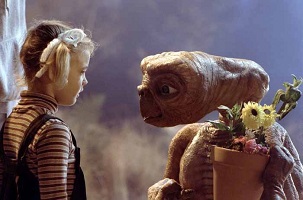
William Kotzwinkle (Scranton, 22 november 1943)
Scene uit de film van Steven Spielberg uit 1982
De Nederlands dichteres en schrijfster Elisabeth Maria Post werd geboren in Utrecht op 22 november 1755. Zie ook alle tags voor Elisabeth Maria Post op dit blog.
Uit: Het land, in brieven
“Mijne vriendschap, waardste Eufrozyne kan u niet gelukkiger maken, dan ik mij door de uwe gevoel. Word dus in u zelf gewaar, dat ge mij doet genieten. Lieve vriendin van mijne jeugd! gij zijt mij een edel Gods geschenk. Welke tedere aandoeningen worden door u verlevendigd, die werkeloos in mij sluimerden, of niet dan afgestorvene vrienden ten voorwerp hadden! Welk eene vrolijkheid spreidt deze gedagten op mijn toekomstig lot: ‘Nu heb ik die vriendin, naar welke ik jaren lang vrugteloos zogt, – gevonden! Harmonisch gevoel boeit onze zielen aan elkander. De gedagten mijner eenzaamheid zal ik aan den boezem mijne Eufrozyne ontlasten; geen onheil zal mij doen weenen, of hare getrouwe ziel zal er in deelen; in hare vreugd zal ik vrolijk zijn; daar ik hulp behoef zal zij gereed zijn! de Godsvrugt, ons beide even dierbaar, zal onze banden versterken en ons doen ijveren om elkander op het pad der deugd voorbij te streven! dan eens zal hare vurigheid, mijne laauwheid verdrijven; dan eens mijn ernst, hare standvastigheid verdubbelen! – Zoo zullen de gelukkige jaren onzer jeugd ongemerkt als dagen voorbij gaan. – Zoo zal de langdurige kennis en ondervinding van elkanders karakter, in de rijper jaren des ouderdoms, onze trouw onverbrekelijk maken. – Zoo zal Eufrozyne’s laatste zugt mij, of de mijne haar zegenen; – zoo ik haar overleve, dan zal ik, in de uitkomst van haar lot, een beeld van het mijne zien. Dikwils zal dan haar graf mijne zugten hooren: en haar zerk de kenmerken dragen, dat het overblijfzel, het welk hij bedekt, mij dierbaar was.”
Elisabeth Maria Post (22 november 1755 – 3 juli 1812)
Het Drostehuis in Amerongen, waar de schrijfster van 1775 tot 1788 woonde.
Zie voor nog meer schrijvers van de 22e november ook mijn blog van 22 november 2015 deel 2.
Zie voor bovenstaande schrijvers ook mijn blog van 22 november 2008, mijn blog van 22 november 2007 en ook mijn blog van 22 november 2006.
